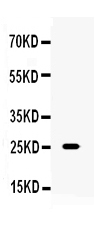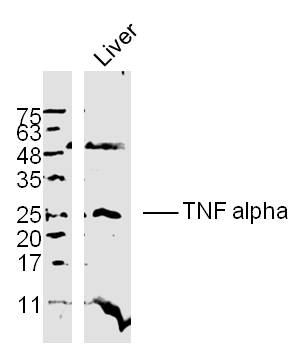![Sandwich ELISA analysis of serial diluted mouse TNF-alpha recombinant protein using TNF alpha antibody] Coating : GTX15821 TNF alpha antibody [XT3] Detection : GTX15823 TNF alpha antibody [XT22] (Biotin) Sandwich ELISA analysis of serial diluted mouse TNF-alpha recombinant protein using TNF alpha antibody] Coating : GTX15821 TNF alpha antibody [XT3] Detection : GTX15823 TNF alpha antibody [XT22] (Biotin)](https://www.genetex.com/upload/website/prouct_img/normal/GTX15821/GTX15821_76_ELISA_w_23060620_974.webp)
Sandwich ELISA analysis of serial diluted mouse TNF-alpha recombinant protein using TNF alpha antibody] Coating : GTX15821 TNF alpha antibody [XT3] Detection : GTX15823 TNF alpha antibody [XT22] (Biotin)
TNF alpha antibody [XT3]
GTX15821
ApplicationsWestern Blot, ELISA, ImmunoHistoChemistry, ImmunoHistoChemistry Paraffin, Neutralisation/Blocking
Product group Antibodies
ReactivityHuman, Mouse
TargetTnf
Overview
- SupplierGeneTex
- Product NameTNF alpha antibody [XT3]
- Delivery Days Customer9
- Application Supplier Note*Optimal dilutions/concentrations should be determined by the researcher.Not tested in other applications.
- ApplicationsWestern Blot, ELISA, ImmunoHistoChemistry, ImmunoHistoChemistry Paraffin, Neutralisation/Blocking
- CertificationResearch Use Only
- ClonalityMonoclonal
- Clone IDXT3
- Concentration1 mg/ml
- ConjugateUnconjugated
- Gene ID21926
- Target nameTnf
- Target descriptiontumor necrosis factor
- Target synonymsDIF, TNF-a, TNF-alpha, TNFSF2, TNFalpha, Tnfa, Tnfsf1a, Tnlg1f, tumor necrosis factor, cachectin, tumor necrosis factor ligand 1f, tumor necrosis factor ligand superfamily member 2, tumor necrosis factor-alpha
- HostRat
- IsotypeIgG1
- Protein IDP06804
- Protein NameTumor necrosis factor
- Scientific DescriptionThis gene encodes a multifunctional proinflammatory cytokine that belongs to the tumor necrosis factor (TNF) superfamily. Members of this family are classified based on primary sequence, function, and structure. This protein is synthesized as a type-II transmembrane protein and is reported to be cleaved into products that exert distinct biological functions. It plays an important role in the innate immune response as well as regulating homeostasis but is also implicated in diseases of chronic inflammation. In mouse deficiency of this gene is associated with defects in response to bacterial infection, with defects in forming organized follicular dendritic cell networks and germinal centers, and with a lack of primary B cell follicles. Alternative splicing results in multiple transcript variants. [provided by RefSeq, Jun 2013]
- ReactivityHuman, Mouse
- Storage Instruction-20°C or -80°C,2°C to 8°C
- UNSPSC41116161
References
- Improvement of wound healing by capsaicin through suppression of the inflammatory response and amelioration of the repair process.Read this paper
- Functional Plasmon-Activated Water Increases Akkermansia muciniphila Abundance in Gut Microbiota to Ameliorate Inflammatory Bowel Disease.Read this paper
- Intestinal Mucosal Barrier Improvement with Prebiotics: Histological Evaluation of Longish Glucomannan Hydrolysates-Induced Innate T Lymphocyte Activities in Mice. Chang SC et al., 2022 May 26, NutrientsRead this paper
- The Periodontopathic Pathogen, Porphyromonas gingivalis, Involves a Gut Inflammatory Response and Exacerbates Inflammatory Bowel Disease. Lee YC et al., 2022 Jan 11, PathogensRead this paper





![WB analysis of purified TNF alpha recombinant protein using GTX14195 TNF alpha antibody [XT3.11]. Lane 1 : 1 ug reduced purified mouse TNFα Lane 2 : 0.5 ug reduced purified mouseTNFα Dilution : 15 ug/ml](https://www.genetex.com/upload/website/prouct_img/normal/GTX14195/GTX14195_20200917_WB_w_23060620_697.webp)
![Sandwich ELISA analysis of serial diluted mouse TNF-alpha recombinant protein using TNF alpha antibody] Coating : GTX15821 TNF alpha antibody [XT3] Detection : GTX15823 TNF alpha antibody [XT22] (Biotin)](https://www.genetex.com/upload/website/prouct_img/normal/GTX15823/GTX15823_77_ELISA_w_23060620_163.webp)
![Sandwich ELISA analysis of mouse TNF-alpha protein using GTX03007 TNF alpha antibody [MT1C8 + 23C9] as coating antibody and GTX03005-02 TNF alpha antibody [MT11B10] (Biotin) as detecting antibody.](https://www.genetex.com/upload/website/prouct_img/normal/GTX03005-02/GTX03005-02_20210507_ELISA_w_23053123_787.webp)
![Sandwich ELISA analysis of mouse TNF-alpha protein using GTX03007 TNF alpha antibody [MT1C8 + 23C9] as coating antibody and GTX03005-02 TNF alpha antibody [MT11B10] (Biotin) as detecting antibody.](https://www.genetex.com/upload/website/prouct_img/normal/GTX03007/GTX03007_20210507_ELISA_w_23053123_401.webp)